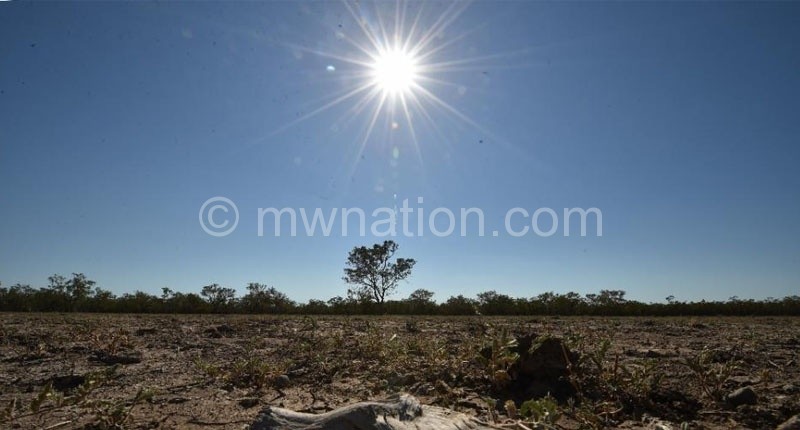Climate change is real
This year, more than any other year, Malawi has felt the pangs of poor weather patterns due to climate change. FRED KOSSAM, head of Climate Change and Research Services in the Department of Climate Change and Meteorological Services talks to JACK MCBRAMS to explain how climate change has impacted the country and the mitigation measures government has put in place to cushion the calamity.
In simple language, what is climate change and what does it entail?
Climate change in simple terms could be defined as permanent change in average weather conditions on an area for a long period of time say over 30 years. Climate has been changing naturally in the past, but what is worrying now is the rate of change; it is so fast that humans and ecosystems are failing to adjust naturally to the change in the climatic conditions. This is a problem.
It is confirmed that human activities, particularly those that lead to emissions of greenhouse gases, are the main cause of this rapid change since 1800. These activities include industrialisation, cutting down trees, and improper waste disposal, among others. In Malawi climate change is manifested in change in weather patterns such as late onset of rains, short rainy seasons, early cessation of rains, more frequent dry spells of longer duration, frequent flooding.
These are really causing problems since our economy is agro-based. Current projections indicate that these will be more severe if we do not reduce greenhouse gas emissions globally. As such, everyone has to take a keen interest in the information generated by the Department of Climate Change and Meteorological Services. The climate knowledge that has been built in the last decades is essential base to support the path towards more ambitious actions to address climate change and climate variability as well as in providing meteorological and hydrological services to protect life and property from natural disasters related to weather and to safeguard life, property and environment, and to contribute to sustainable development.
What can government; communities and individuals do to mitigate problems brought about due to climate change?
The government of Malawi is already working hard to put in place policies, projects and programmes that will enhance adaptive capacity of its citizens. The government has developed National Adaptation programmes of actions (Napa) to address urgent and immediate adaptation needs and now has embarked on a National Adaptation Plan Process with the view of addressing adaptation in the medium and long term. Government has also developed a Climate Change Investment Plan with a view to promote investment in climate change management. Government is also promoting measures that promote afforestation, sustainable agriculture practices such as promotion of use of fast growing varieties of crops, agro-forestry, zero-tillage as well as effective use of climate and weather information at household level.
As you may be aware, proper use of weather and climate information can make a difference in terms planning of household activities including in farming decisions. As such, everyone has to take a keen interest in the information generated by the Department of Climate Change and Meteorological Services. The climate knowledge that has been built in the last decades is essential base to support the path towards more ambitious actions to address climate change and climate variability as well as in providing meteorological and hydrological services to protect life and property from natural disasters related to weather and to safeguard life, property and environment, and to contribute to sustainable development.
In terms of climate change, what is Malawi’s policy? Is it adaption or migration. And why?
The draft climate change policy covers all aspect of climate change, including adaptation, mitigation, research and systematic observations, capacity building finance and resource mobilisation as well as coordination structure for climate change in Malawi. We need to look at climate holistically as its impact is cross cutting such that all sectors are affective. We need to safeguard the social economic gains that we have achieved this far. All these can be wiped out in a day if we don’t manage our weather and climate in Malawi.
If not, which areas are most urgent? Finance, technology, personnel?
What is more urgent for Malawi is financial and technical support to implement adaptation actions. Projects and programmes are already there as stipulated in the national climate change investment plan which clearly articulates what the country needs in all aspects of climate change management. So, if these are funded we will make a difference to the local man and woman in the village.
Has government done enough to make communities understand what climate change is? Does the average Malawian understand climate change to take the right and proper action to reduce the impact?
Yes. Several initiatives have taken place to empower the locals to understand climate and weather information, but more needs to be done to reach out to every corner of the country. This has been slow due to insufficient resources to embark on massive awareness programmes across the country. However, many people are now taking a keen interest in weather and climate information which is good. People are now seeing the value of weather and climate information in their lives.
Anything more to add?
Impacts of climate change are already here. So, we need to work together to minimise them. The Malawi citizenry needs to use and value weather and climate information in their daily lives as well as to recognise that weather information is a perishable need and a necessity. Time for doing things differently is here now and finally people need to always remember that in any tussle between weather and man, the weather shall always win.





